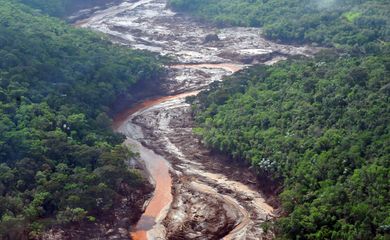British judges deliberate on Mariana tragedy again

The collapse of the Samarco dam in the town of Mariana, Minas Gerais state, is yet again on the agenda in British courts. A trial that began Monday (Apr. 4) and continues on until Friday (8) is considering the appeal filed by people affected by the tragedy. They request the recognition of the UK’s jurisdiction in the case.

In November last year, the incident turned six years old. In the tragedy, 39 million cubic meters of tailings were released. The wave of sludge claimed the lives of 19 people, destroyed communities, and brought pollution to dozens of towns from the Doce River basin all the way to its mouth in the neighboring state of Espírito Santo.
The UK lawsuit was filed in 2018 by more than 200 thousand affected people, three indigenous communities, approximately 600 companies, and 25 municipalities, as well as the Archdiocese of Mariana. They seek compensation from BHP Billiton, the London-based Anglo-Australian mining company that is a shareholder in Samarco, like Vale.
Represented by English law firm PGMBM, the affected claim that the Brazilian legal system has failed to ensure proper compensation. This argument, refuted by BHP Billiton, was not accepted in the first instance. The claim was considered “abuse of process” by Judge Mark Turner of the Manchester Civil Court, where the case is being considered. In November 2020, he argued there was a risk of irreconcilable sentences, with simultaneous trials in Brazil and the UK.
“One can safely predict that such incessant cross-contamination of proceedings would lead to absolute chaos in the conduct of litigation in both jurisdictions, the procedural position of each being in a state of almost constant flux,” Turner wrote at the time. That decision was again upheld in March last year, thus dismissing the case.
Faced with the double setback, the PGMBM law firm filed an extraordinary appeal and scored a victory in July last year. The London Court of Appeal accepted a request to reopen the case and the question of jurisdiction was back on the agenda. This is the issue at the core of this week’s trial: until Friday (8), the affected people and the mining company, through their lawyers, must present their views. The sessions will be broadcast live on social media.
PGMBM lawyers believe the judges should issue a verdict in June or July. If they decide UK courts have legal competence to deal with the case, the trial will finally move on to the merits.
Reparation in Brazil
To reiterate its arguments in favor of the affected, PGMBM attached to the lawsuit a 2020 report by special rapporteur of the United Nations Baskut Tuncak.
After considering the case, he concluded after nearly five years that those responsible for the collapse failed to effectively offer the victims support or compensation. He also underscored the inefficiency of the Renova Foundation, noting its true purpose seems to be “to limit the liability of BHP and Vale, rather than to provide any semblance of an effective remedy.”
To repair the damage from the tragedy, a Transaction and Conduct Adjustment Term (TTAC) was signed in March 2016. The three mining companies agreed to bear the costs and sided with the federal government and the governments of Minas Gerais and Espírito Santo in spearheading the efforts. The creation of Renova Foundation was based on the agreement and was tasked with managing all the necessary measures.
Data from the foundation shows that more than BRL 20 billion has been spent in reparation, of which BRL 8.74 billion is earmarked for compensation and emergency financial aid. The foundation’s conduct, however, has been questioned by federal as well as Minas Gerais state prosecutors. They mention a lack of autonomy and claim the reparation process is ultimately controlled by the mining companies. The prosecutors also challenge court decisions that led to the implementation of the simplified compensation system late in 2020, as well as values and procedures adopted, whereby some 52 thousand people affected had access to compensation.
Last year, a mediation process led by Brazil’s National Council of Justice was initiated, which may result in a new agreement on the Mariana tragedy and provide a solution for more than 80 thousand lawsuits awaiting deliberation. Late in 2021 and early this year, the people affected were heard in online public hearings, where they had a chance to talk about their reality.


